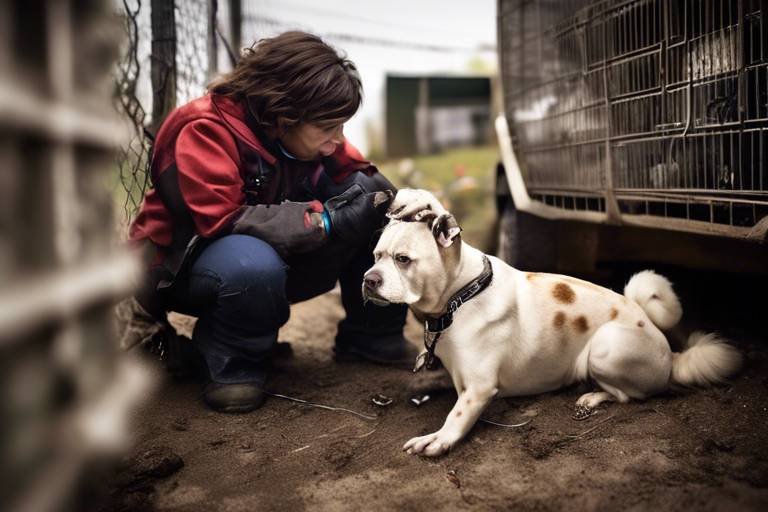How to Create a Positive Adoption Experience
Adoption is more than just a legal process; it's a profound journey filled with emotions, challenges, and the potential for immense joy. Imagine embarking on a road trip where every twist and turn brings new experiences, some exhilarating and others daunting. The key to navigating this journey successfully lies in creating a positive adoption experience for everyone involved. This article will explore essential strategies and insights that can help both prospective parents and children thrive during this transformative period.
Understanding the nuances of the adoption process is the first step. It’s much like preparing for a marathon; you wouldn’t just show up on race day without training, right? From the initial research phase to finalizing the adoption, each step requires patience and preparation. Knowing what to expect can significantly reduce anxiety and foster a nurturing environment for the child. This journey can be filled with surprises, but being well-informed can help you embrace them with open arms.
As you prepare for adoption, consider the importance of building a robust support network. Think of your support system as a safety net; it’s there to catch you when things get tough. This network can include family members, friends, and even fellow adoptive parents. Their roles are vital, providing emotional assistance and encouragement during moments of uncertainty. Having people to share your experiences with can make all the difference, turning challenges into shared stories of resilience.
In addition to personal connections, don’t underestimate the value of local resources. Many communities offer support groups and counseling services tailored specifically for adoptive families. These resources can help you navigate the emotional complexities of adoption while celebrating the milestones you achieve along the way. For instance, attending a local support group can provide a safe space to share your feelings and learn from others who have walked a similar path.
In our digital age, online support communities have emerged as invaluable resources. They allow adoptive families to connect with one another, share their journeys, and offer advice. Imagine a virtual campfire where stories are shared, and wisdom flows freely. These platforms can provide encouragement and a sense of belonging, especially during challenging times. Whether through social media groups or dedicated forums, there’s a wealth of knowledge and camaraderie waiting to be tapped into.
Moreover, engaging with professional counseling services can be a game-changer. Just as athletes have coaches to help them refine their skills, families can benefit from therapists who specialize in adoption-related issues. These professionals can help address emotional complexities, ensuring that everyone is mentally and emotionally prepared for the changes that adoption brings. It’s like having a map that guides you through uncharted territory, helping you find your way with confidence.
As the day of the child's arrival approaches, proper preparation becomes paramount. Creating a welcoming home environment is crucial for fostering security and love. Think about setting up a cozy space where the child can feel safe and cherished. This could include a special corner filled with their favorite books or toys, making it a place they can call their own. The goal is to transform your house into a home that radiates warmth and acceptance.
Finally, cultivating open communication is essential for a successful adoption experience. Imagine a garden where trust and understanding bloom. Honest discussions among family members and with the child can lay the foundation for a loving relationship. It's important to talk about feelings, expectations, and the child's unique adoption story. This not only builds trust but also helps the child develop a strong sense of identity.
When discussing adoption with the child, consider age-appropriate conversations that respect their understanding and emotions. It’s like telling a story where they are the hero, and you are merely guiding them through their narrative. Engaging with birth families can also be beneficial. Maintaining open dialogue and respect in these interactions fosters a sense of belonging for the child, allowing them to feel connected to their roots while embracing their new family.
- What are the first steps in the adoption process? The initial steps typically include researching different types of adoption, choosing an agency, and completing necessary paperwork.
- How can I find support during the adoption journey? Consider reaching out to local support groups, online communities, or professional counselors who specialize in adoption.
- What should I discuss with my child about their adoption? It's important to have open and age-appropriate conversations about their adoption story, ensuring they feel loved and secure.
- How can I prepare my home for a child? Create a welcoming environment by setting up a personal space for the child filled with comforting items like toys and books.

Understanding the Adoption Process
Gaining clarity about the adoption process is crucial for prospective parents. It’s like embarking on a thrilling adventure; the more you know about the journey ahead, the smoother your ride will be. The adoption process can be complex, with various steps that require attention and patience. From initial research to the finalization of the adoption, each phase is a vital piece of the puzzle that contributes to a successful outcome. So, let’s break it down!
The first step typically involves researching adoption agencies and understanding the different types of adoption available, such as domestic, international, or foster care adoption. Each option comes with its own set of guidelines, requirements, and emotional implications. Prospective parents should take the time to explore these avenues thoroughly and choose one that aligns with their values and lifestyle.
Once you’ve selected an agency, the next step is to complete a home study. This is a comprehensive assessment that evaluates your family’s readiness for adoption. Think of it as a deep dive into your family dynamics, lifestyle, and motivations for adopting. While it may feel invasive at times, this process is designed to ensure that children are placed in safe and loving environments. Remember, patience is key here; the home study can take time, but it’s a crucial step in ensuring a positive outcome for everyone involved.
After the home study, the waiting game begins. This phase can be emotionally taxing, as prospective parents may feel a mix of excitement and anxiety. It’s essential to stay connected with your support network during this time. Surround yourself with friends and family who understand your journey and can provide encouragement. Engaging in activities that bring you joy can also help alleviate the stress of waiting.
Once a match is made, the next step is the placement of the child. This moment is often filled with a whirlwind of emotions—joy, love, and perhaps a bit of apprehension. As you prepare for the arrival of your little one, ensure that your home is a welcoming and nurturing environment. This could involve setting up a cozy nursery or creating a space that feels safe and inviting.
Finally, the process culminates in the legal finalization of the adoption. This is where the magic happens! A court hearing is held, and, if all goes well, you’ll officially become the child’s legal parent. It’s a moment filled with joy and relief, marking the end of a long journey and the beginning of a beautiful new chapter in your life.
In summary, while the adoption process can be intricate and sometimes overwhelming, being informed and prepared can make a significant difference. Embrace the journey with an open heart, and remember that every step you take brings you closer to creating a loving family.
- What is the typical duration of the adoption process? The duration can vary widely depending on factors such as the type of adoption and the agency involved. Generally, it can take anywhere from a few months to several years.
- Are there any specific requirements to become an adoptive parent? Yes, requirements can differ by agency and state, but typically include being of legal age, having a stable income, and completing a home study.
- Can I adopt if I am single? Absolutely! Many single individuals successfully adopt children. The most important factor is your ability to provide a loving and stable environment.
- What support is available for adoptive families? There are numerous resources available, including local support groups, online communities, and professional counseling services.

Building a Support Network
When embarking on the journey of adoption, one of the most vital components to ensure a positive experience is building a robust support network. Think of this network as your safety net, ready to catch you when the emotional rollercoaster of adoption takes a dip. A strong support system can transform the challenges of adoption into opportunities for connection and growth. It’s not just about having people around; it’s about having the right people who understand your journey and can offer genuine support.
The first step in creating this network is to reach out to family and friends. These individuals can provide a listening ear, help with practical tasks, or simply be there to celebrate the joyous milestones. Their involvement can help ease the transition for both the child and the adoptive parents. However, it’s essential to communicate your needs clearly. Sometimes, loved ones may not know how to help unless you tell them. So, don’t hesitate to ask for what you need, whether it’s a meal, babysitting, or just someone to talk to.
In addition to your immediate circle, consider connecting with adoption communities. These groups are often filled with individuals who have walked the same path and can offer invaluable insights. They can share their experiences, provide advice, and help you feel less isolated. Many communities organize events, workshops, and support groups where you can meet others who understand the unique challenges of adoption. Engaging with these communities can be incredibly empowering and can provide a sense of belonging.
Identifying local resources is another critical aspect of building your support network. Many communities offer support groups and counseling services specifically for adoptive families. These resources can be a lifeline during challenging times, offering professional guidance and a safe space to share experiences. For instance, you might find local organizations that host regular meet-ups or workshops focusing on adoption-related topics. Being part of such groups can help you navigate the complexities of adoption and celebrate the joyful moments along the way.
In today’s digital age, online support communities have become a treasure trove of resources and connections for adoptive families. Platforms like Facebook, Reddit, and specialized forums allow you to connect with others who share similar experiences. These virtual spaces are great for asking questions, sharing stories, and receiving encouragement from people who truly understand the ups and downs of adoption. The anonymity of online platforms can also make it easier to discuss sensitive topics that might be difficult to bring up in person.
Another essential element of your support network is professional counseling services. Seeking the help of a therapist who specializes in adoption can be incredibly beneficial. They can help you and your family navigate the emotional complexities that often arise during the adoption process. Whether it’s addressing feelings of loss, identity issues for the child, or even the stress of adjusting to a new family dynamic, professional guidance can provide the tools necessary to foster a healthy emotional environment. Remember, it’s okay to ask for help, and doing so can set a positive tone for your entire adoption journey.
In conclusion, building a support network is not just a task; it’s a vital part of the adoption process. By surrounding yourself with understanding family, friends, and professionals, you’re laying the groundwork for a nurturing environment that can help you and your child thrive. Don’t underestimate the power of community and connection; they are your best allies in this beautiful journey of adoption.
Finding Local Resources
When embarking on the journey of adoption, one of the most impactful steps you can take is to find local resources that can support you along the way. These resources are like a safety net, providing guidance, encouragement, and a sense of community during what can often be a challenging process. From support groups to counseling services, local resources can help you navigate the emotional landscape of adoption, ensuring that you are not alone in your experiences.
Support groups, for instance, offer a space where you can connect with others who are on a similar journey. These gatherings allow you to share your thoughts, feelings, and experiences, creating a sense of camaraderie that can be incredibly comforting. Many local organizations host regular meetings, workshops, and events specifically tailored for adoptive families. Engaging with these groups can help you build friendships and gain insights from those who have walked the path before you.
Additionally, local counseling services can provide individualized support tailored to your family's unique needs. Therapists who specialize in adoption-related issues can help you process the complex emotions that may arise before, during, and after the adoption process. They can also guide you in preparing your family for the transition and foster healthy communication among family members. It's essential to find professionals who not only understand adoption but also resonate with your family's values and dynamics.
To make it easier for you to find these resources, consider the following options:
- Adoption Agencies: Many agencies offer post-adoption support services, including counseling and workshops.
- Community Centers: Local community centers often host support groups and family activities that can help you connect with other adoptive families.
- Hospitals and Clinics: Some hospitals have resources for new parents, including those adopting, and can provide referrals to local support services.
Remember, reaching out for help is not a sign of weakness; it's a proactive step towards creating a nurturing environment for your child. By utilizing these local resources, you can enhance your adoption experience and ensure that you and your family are well-prepared for the journey ahead.
Online Support Communities
In today's fast-paced digital world, have emerged as invaluable resources for adoptive families navigating the complexities of adoption. These virtual platforms serve as safe havens where individuals can share their experiences, seek advice, and find encouragement from others who truly understand the journey. Imagine walking into a room filled with people who have faced similar challenges; that’s the essence of these online spaces. They allow you to connect with others, break down feelings of isolation, and foster a sense of belonging.
One of the greatest advantages of online support communities is their accessibility. Whether you're a night owl or an early bird, you can log in at any hour and find someone ready to lend an ear or share their story. This flexibility is crucial, especially for adoptive parents who may find themselves overwhelmed or in need of immediate support. Furthermore, many communities offer a variety of platforms, including forums, social media groups, and dedicated websites, allowing you to choose the medium that feels most comfortable for you.
Within these communities, members often discuss a range of topics that can help ease the adoption process. Here are some common themes you might encounter:
- Sharing Personal Stories: Hearing about others' journeys can provide valuable insights and reassurance.
- Advice on Challenges: From dealing with emotional hurdles to navigating legal processes, members exchange tips that can make a difference.
- Celebrating Milestones: These communities often become a place to celebrate the small victories, from a child’s first day at school to successful family outings.
Moreover, online support groups often host virtual events, webinars, and Q&A sessions with experts in the field of adoption. These events can be a treasure trove of information, helping families to stay informed about the latest resources, legal changes, and best practices in adoption. Think of it as having a mentor available at your fingertips, ready to guide you through the intricacies of your unique situation.
However, while online support communities can be incredibly beneficial, it’s important to approach them with a discerning eye. Not all advice will be applicable to your specific circumstances, and it’s essential to verify information, especially when it comes to legal matters or emotional well-being. Always remember that while shared experiences are valuable, your family’s journey is uniquely your own.
In conclusion, online support communities offer a wealth of resources and connections for adoptive families. They create a space where you can find understanding, share your journey, and build relationships that can last a lifetime. So, if you haven't already, consider joining one of these communities—because when it comes to adoption, you don’t have to go it alone.
Professional Counseling Services
When it comes to navigating the emotional complexities of adoption, can be a game changer. Imagine standing at the edge of a vast ocean, with waves of uncertainty crashing around you. A skilled therapist can act as your guide, helping you find a safe passage through the turbulent waters of your feelings and concerns. These professionals are trained to address the unique challenges that adoptive families face, offering insights that can ease the transition for both parents and children.
One of the significant advantages of seeking professional counseling is the opportunity for tailored support. Each family's journey is different, and a therapist can provide personalized strategies that resonate with your specific situation. They can help you explore your feelings about adoption, discuss any fears or anxieties, and equip you with coping mechanisms to deal with potential challenges. This process often involves individual sessions for parents, as well as family therapy sessions that include children, fostering a united front in addressing emotional needs.
Moreover, counseling can be particularly beneficial during key transition periods, such as the arrival of the child or significant milestones in their development. For example, a therapist might help parents prepare for how to discuss the adoption story with their child or navigate the complexities of maintaining a relationship with the birth family. This proactive approach can prevent misunderstandings and build a strong foundation of trust and communication within the family.
To give you a better understanding, here’s a brief overview of what to expect from professional counseling services:
| Service Type | Description |
|---|---|
| Individual Therapy | One-on-one sessions focusing on personal feelings and challenges related to adoption. |
| Family Therapy | Sessions that involve the entire family to discuss dynamics and improve communication. |
| Workshops | Group sessions that provide education and shared experiences among adoptive families. |
| Support Groups | Regular meetings with other adoptive families to share experiences and provide mutual support. |
In conclusion, engaging with a professional counselor can be a significant step toward ensuring a positive adoption experience. By addressing emotional complexities head-on, families can foster a nurturing environment that promotes understanding and love. So, if you're considering adoption or are already on this journey, don’t hesitate to reach out for help—it's a sign of strength, not weakness.
- What should I look for in an adoption counselor? Look for a counselor who specializes in adoption and has experience working with families in similar situations.
- How often should we attend counseling sessions? The frequency can vary based on individual needs; however, many families find bi-weekly or monthly sessions beneficial.
- Are online counseling services effective? Yes! Many families find online counseling to be just as effective as in-person sessions, providing flexibility and convenience.
- Can counseling help with the child's adjustment? Absolutely! Counseling can provide strategies for both parents and children to support a smoother adjustment process.
Preparing for the Child's Arrival
Preparing for a child's arrival is one of the most exhilarating yet nerve-wracking experiences for adoptive parents. It's akin to waiting for a surprise party where you know the guest of honor is about to walk through the door, but you have no idea how the evening will unfold. The key to making this transition smooth and welcoming lies in creating an environment that radiates love, security, and warmth. This preparation can be broken down into a few essential steps that will not only help you get ready physically but also mentally and emotionally for the exciting journey ahead.
First and foremost, it’s crucial to set up a safe and nurturing space for your new family member. This means more than just assembling a crib or decorating a nursery. Think about the overall atmosphere of your home. Is it a place where your child will feel comfortable? Consider the following:
- Choose calming colors for the room that promote relaxation.
- Add personal touches, like family photos or artwork, to make the space feel inviting.
- Ensure the room is equipped with all the essentials, from diapers to toys, but also remember to include items that reflect your child's heritage and background.
Furthermore, it's important to engage in some practical preparations. This includes organizing your daily routine to accommodate your child's needs. Just like a chef prepares their kitchen before cooking a meal, you should prepare your household for the new rhythm that will come with your child's arrival. This means adjusting work schedules, planning for childcare, and even discussing household responsibilities with your partner. It's all about teamwork and ensuring that everyone is on the same page.
Another vital aspect of preparation is emotional readiness. Before your child arrives, take the time to reflect on your feelings about adoption and the journey that brought you here. It’s normal to experience a whirlwind of emotions, from excitement to anxiety. Consider journaling your thoughts or discussing them with your partner or a trusted friend. This emotional groundwork will better equip you to support your child as they navigate their own feelings about adoption.
Moreover, it’s beneficial to familiarize yourself with the adoption process and the unique challenges that may arise. Knowledge is power! Understanding the potential emotional and behavioral responses your child might exhibit can help you respond with compassion and patience. For instance, children may experience feelings of loss or confusion regarding their birth family. Being prepared for these discussions will foster a stronger bond between you and your child.
Lastly, don't forget to celebrate the arrival of your child! This is a momentous occasion that deserves recognition. Whether it's a small family gathering or a larger celebration with friends, make it a point to mark this significant milestone. It will not only make your child feel cherished but also reinforce the idea that they are a valued member of your family. Remember, the goal is to create a sense of belonging that lasts a lifetime.
1. What should I include in my child's nursery?
Aim for essentials like a crib, changing table, and storage for clothes and toys. Adding personal touches like family photos or cultural items can make the space feel more welcoming.
2. How can I prepare emotionally for my child's arrival?
Reflect on your feelings about adoption, discuss your thoughts with your partner, and consider seeking support from others who have gone through the process.
3. Should I maintain contact with my child's birth family?
If possible, maintaining a respectful relationship can benefit your child by providing them with a sense of belonging and understanding of their background.

Cultivating Open Communication
Open communication is the lifeblood of a successful adoption experience. It serves as the bridge that connects adoptive parents and their children, fostering a nurturing environment where everyone feels valued and heard. Think of it as the foundation of a house; without a solid base, the structure can crumble. This is especially true in adoption, where emotions can run high, and the need for understanding is paramount. Establishing a culture of open dialogue not only helps in building trust but also empowers children to express their feelings and concerns freely. So, how can adoptive families cultivate this vital communication?
First and foremost, it's essential to create a safe space for discussions. This means encouraging children to share their thoughts without the fear of judgment or reprimand. Parents should actively listen, showing empathy and understanding. Imagine a garden where every flower has its unique beauty; similarly, every child's feelings deserve to be acknowledged and nurtured. This kind of environment allows children to blossom and develop a strong sense of self-worth.
Moreover, it's crucial to have age-appropriate conversations about adoption. When discussing sensitive topics, consider the child's age and emotional maturity. For younger children, simple explanations can suffice, while older kids may need more in-depth discussions about their adoption story. Here’s a quick guide to help parents navigate these conversations:
| Age Group | Communication Tips |
|---|---|
| 0-5 years | Use simple language and storybooks about adoption. |
| 6-10 years | Encourage questions and share family stories related to adoption. |
| 11-15 years | Discuss feelings openly and address any concerns they may have. |
| 16+ years | Engage in deeper conversations about identity and family connections. |
Another important aspect of open communication is engaging with the child's birth family when appropriate. This can provide a sense of continuity and belonging for the child. Maintaining a respectful and open dialogue with birth families can help children feel more secure in their identity. It’s like weaving a rich tapestry where every thread contributes to the overall picture of who they are. Encourage your child to ask questions about their birth family, and be prepared to answer honestly. This openness not only honors the child’s roots but also reinforces the idea that love and family can take many forms.
In conclusion, cultivating open communication in an adoptive family is not just about sharing information; it's about creating a culture of trust and support. By fostering an environment where feelings are expressed freely, and every voice is valued, adoptive families can navigate the complexities of adoption with grace. Remember, the journey of adoption is a shared experience, and open communication can make it a beautiful one.
- Why is open communication important in adoption? Open communication fosters trust and understanding, allowing children to express their feelings and concerns.
- How can I talk to my child about their adoption? Use age-appropriate language, encourage questions, and share family stories related to adoption.
- Should I maintain contact with my child's birth family? If appropriate, maintaining contact can provide a sense of belonging and continuity for the child.
Discussing Adoption with the Child
When it comes to discussing adoption with your child, it’s essential to approach the topic with care and compassion. Every child deserves to understand their story, and as adoptive parents, you hold the key to unlocking that narrative. But where do you start? It can feel daunting, but remember, this is a journey you’re embarking on together. Just like a treasure map, each conversation reveals a little more about their unique path and helps them piece together their identity.
Begin by creating a safe and open environment where your child feels comfortable expressing their feelings. This means choosing the right time and place to have these conversations—think cozy spots at home or during a relaxed family outing. You might ask, “What do you know about your adoption?” This question not only opens the door to dialogue but also gives you insight into what your child understands and how they feel. Remember, it’s not just about sharing facts; it’s about building trust and encouraging them to ask questions.
As you discuss adoption, be mindful of using age-appropriate language. For younger children, simple explanations work best, while older kids may require more detailed conversations. It’s crucial to be honest while also being sensitive to their emotional state. You might say something like, “You were loved so much that your birth parents wanted you to have the best life possible, and that’s why they chose adoption.” This kind of narrative helps them feel cherished rather than abandoned.
Consider the following points when discussing adoption:
- Reassure them: Let your child know that they are loved and wanted. Remind them that adoption is a positive choice made out of love.
- Encourage questions: Be open to all kinds of questions, even the tough ones. It’s okay if you don’t have all the answers—what matters is that you’re willing to discuss it.
- Share stories: If appropriate, share stories of other adopted individuals or families to help normalize their experience.
As your child grows, their understanding of adoption will evolve. They may revisit the topic at different stages of their life, so keeping the lines of communication open is vital. This ongoing dialogue can help them navigate their feelings about their identity and their place in the world. In essence, you’re not just discussing adoption; you’re fostering a sense of belonging and security in their life.
Lastly, don’t forget to celebrate their adoption journey. Create special traditions or rituals that honor their story. Whether it’s a family adoption day or a simple acknowledgment of their unique path, these moments can reinforce their sense of belonging and love. After all, adoption is not just a one-time conversation; it’s a lifelong journey filled with love, understanding, and connection.
Engaging with Birth Families
Engaging with birth families is a vital aspect of the adoption journey that can greatly benefit both the child and the adoptive family. It’s like weaving a tapestry where every thread, including the birth family’s story, adds depth and color to the child’s identity. Building a respectful and open relationship with the birth family can foster a sense of belonging for the child, helping them understand their roots and the love that surrounds their adoption.
When approaching the topic of engaging with birth families, it’s essential to consider the feelings and perspectives of everyone involved. Open dialogue can pave the way for mutual respect and understanding. For adoptive parents, this might mean being open to communication with the birth family, whether it’s through letters, phone calls, or in-person visits. Each interaction can serve as a powerful reminder to the child that they are loved by many, not just their adoptive parents.
One effective strategy for maintaining a connection with birth families is to establish clear boundaries and expectations from the outset. This can help everyone feel comfortable and respected. Here are some key points to consider:
- Communication Methods: Decide how you will communicate. Will it be through letters, phone calls, or regular visits? Establishing a method that works for everyone can ease anxiety and promote openness.
- Frequency of Contact: Determine how often you will engage with the birth family. It’s important to find a balance that respects everyone’s comfort levels.
- Respecting Privacy: Be mindful of the birth family's privacy and personal boundaries. Open communication should not infringe on their space or comfort.
Moreover, it’s crucial to prepare the child for these interactions. Discussing their feelings about meeting or communicating with their birth family can help them process their emotions and expectations. It’s like preparing them for a beautiful surprise party; the more they know, the more excited and less anxious they will feel!
In some cases, families may choose to work with a mediator, such as a social worker or counselor, to facilitate discussions. This can ensure that everyone’s feelings are heard and respected. Remember, the goal is to create a supportive environment where the child feels secure in their identity and history.
Ultimately, engaging with birth families is about creating a collaborative framework that honors the child’s past while nurturing their future. By fostering these connections, adoptive families can help their children embrace their unique stories, leading to a more fulfilling and enriched life experience.
- How can I approach my child about their birth family? Start by discussing their adoption story in a way that is age-appropriate, emphasizing love and support from all parties involved.
- What if the birth family does not want to engage? Respect their wishes. Open communication is important, but it should never be forced. Focus on nurturing your child's sense of identity.
- Can engaging with the birth family confuse my child? It may initially bring up complex feelings, but with proper guidance and open discussions, it can enhance their understanding of their identity.
Frequently Asked Questions
- What is the first step in the adoption process?
The first step in the adoption process is to conduct thorough research. This involves understanding the different types of adoption, such as domestic, international, or foster care adoption. It's essential to familiarize yourself with the legal requirements and procedures in your area, as they can vary significantly.
- How can I build a support network during adoption?
Building a support network involves reaching out to family, friends, and local adoption communities. These connections can provide emotional support and practical advice throughout your journey. Consider joining support groups or online forums where you can share experiences and learn from others who have gone through similar situations.
- What local resources should I look for as an adoptive parent?
Local resources can include support groups, counseling services, and workshops specifically designed for adoptive families. These resources can help you navigate the emotional complexities of adoption and celebrate important milestones. Check with local adoption agencies or community centers for available options.
- How do online support communities help adoptive families?
Online support communities offer a platform for adoptive families to connect, share experiences, and seek advice. These virtual spaces can provide a sense of belonging and understanding, especially when facing challenges. You can find groups on social media or dedicated websites focused on adoption support.
- Why is professional counseling important during the adoption process?
Professional counseling can be crucial for addressing the emotional complexities that arise during adoption. Therapists specializing in adoption-related issues can help families prepare mentally and emotionally, ensuring everyone is ready for the changes that come with welcoming a child into their home.
- What steps should I take to prepare for my child's arrival?
Preparing for your child's arrival involves creating a welcoming and loving home environment. This can include setting up a comfortable space for the child, gathering necessary supplies, and discussing family routines. It's also important to mentally prepare for the transition and be ready to provide the support your child will need.
- How can I foster open communication with my adopted child?
Fostering open communication involves creating a safe space for discussions about adoption and feelings. Encourage your child to express their thoughts and emotions, and be honest in your responses. Regularly talking about their adoption story can help build trust and understanding throughout their development.
- What is the best way to discuss adoption with my child?
When discussing adoption with your child, approach the conversation with sensitivity and care. Tailor your discussions to their age and understanding, using simple language to explain their adoption story. It's essential to reassure them that they are loved and that their feelings are valid.
- Should I maintain a relationship with my child's birth family?
Maintaining a relationship with your child's birth family can be beneficial for their sense of identity and belonging. Open dialogue and respect are crucial in these interactions. Discuss with your child what they feel comfortable with regarding contact and ensure that everyone involved understands the boundaries.



















